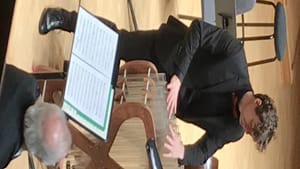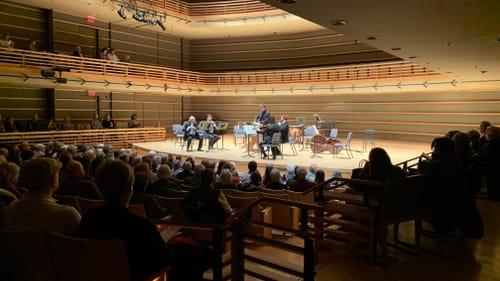Stay in the Loop
BSR publishes on a weekly schedule, with an email newsletter every Wednesday and Thursday morning. There’s no paywall, and subscribing is always free.
A glass from the past
The Chamber Orchestra of Philadelphia presents ‘Music of the Enlightenment’

This week, Jeffrey Brillhart and the Chamber Orchestra of Philadelphia (COP) lit up the Kimmel’s Perelman Theater in a sparkling chamber music concert, Music of the Enlightenment. The program was packed with compositions by 18th-century musical stars inspired by the Age of Enlightenment.
Breaking from the domination of religious thinking, that great intellectual movement posited humanity’s rationality through goals of freedom, knowledge, and happiness. If that sounds familiar, especially in Philadelphia, it’s because our Revolution was built around this European movement. Colonial political leaders were inspired by these ideals, none more than Benjamin Franklin, credited as an inventor of the afternoon’s featured instrument, the glass harmonica.
Brillhart and Bach let loose
For the concert’s first half, COP musicians played four pieces, opening with the overture to L’Olympiade, written in 1734 for an opera by the prolific (50 of his operas survive!) Antonio Vivaldi (1678-1741). Scored for 12 strings and continuo, the work is intensely theatrical, filled with Vivaldi’s musical confidence and consummate construction. In keeping with period performance practice, Brillhart conducted this from the harpsichord with the dramatic sense the overture inspires and requires.
The performance’s first half also featured a concert highlight, Sinfonia No. 1 in G Major by Carl Philipp Emmanuel Bach (1714-1788). This second son of J.S. Bach expanded his family’s long musical tradition. The Sinfonia was one of six commissioned in 1773 by a patron who (according to the excellent program notes) told Bach to “give himself free rein.” Artistically stymied by his former patron, C.P.E. was thus set loose, apparent in this joyful work. The second movement features musical dialogues and a playful dance-like section, ending with a charming suspension into the final (presto) movement, and the musicians dug enthusiastically into their well-realized performance of this fine piece.
Meet the glass harmonica
After intermission, the harpsichord was replaced onstage with an instrument popular in its time but rarely heard today: the glass harmonica. It was first created in 1741, but Franklin’s 1761 modifications made it truly playable—today, a version with water-filled bowls is still played by some. (Its most well-known use now is in the mad scene of Donizetti’s opera Lucia di Lammermoor.) Here, virtuoso musician Friedrich Heinrich Kern played an instrument (also called the verrophone) that is a series of graduated glass tubes filled with water. (In post-concert comments, he said he prefers the bottled-water brand Evian for consistency and the best sound.)
It was a rare treat to see this unique—and remarkably acoustically vivid—instrument featured in two compositions. First was Adagio and Rondo (1791), the last chamber work by Wolfgang Amadeus Mozart (1756-1791). Elegantly constructed, it is scored for glass harmonica, flute (Edward Schultz), oboe (Geoffrey Deemer), viola (Yoshihiko Nakano), and cello (Branson Yeast). Its melodies were beautifully passed among the quintet in an intricate piece that highlights the delicacy and expressiveness of the featured solo instrument.
Virtuosos in glass and strings
Kern played this technically challenging work—full of eight-note chords, scales, cadenzas, and ornaments—with subtlety, pristine technique, and sensitive musicianship. The glass harmonica is immensely tactile and intimate as the musician’s fingers (constantly moistened in water) create ethereal music.

Kern also joined the ensemble for the Rondeau in B-flat Major by Johann Friedrich Reichardt (1752-1814). Written in the 1790s for virtuoso glass harmonica player Marianne Kirchgessner, the work actually showcases the cello, here with Yeast’s gorgeous realization.
For their stylish closing, musicians put aside chairs and stood to play Mozart’s popular Serenade in D Major (Serenata Notturna). Composed in January of 1776 (that familiar year!), its unusual scoring calls for two separate string ensembles and timpani. Filled with Mozartian humor and characterful writing, the work has exciting violin duos (by concertmaster Luigi Mazzocchi and principal second Elizabeth Kaderabek), tricky unison runs, and expansive, superbly played cantabile passages. Witty instrumental cadenzas for the principals (including timpanist Martha Hitchins and bassist Miles B. Davis) were written by Mazzocchi, whose musical leadership grounded the concert.
Period music at the Perelman
Brillhart—who created this concert jointly with COP music director Dirk Brossé—is well-known in the region as an organist, choral director, and superb improvisor. He led the players confidently, investing these nine pieces with freshness and excitement. Inspired by the humanistic energy of the age, Brillhart and the ensemble played these works as if new in a joyful performance.
The Perelman is a remarkably hospitable venue for period music. Its sightlines and acoustics—and warm, clear lighting—make even intimate musical gestures readily apparent. The orchestra certainly knows how to use the space, and with Kern’s luminous sound and virtuosic musicianship on the glass harmonica, there was a lively sense of 18th-century style. The hall was packed with appreciative listeners sent out into the chilly evening revived—and, well, enlightened—by this stellar concert.
What, When, Where
Music of the Enlightenment. Vivaldi, Overture to L’Olimpiade and Concerto for Strings in G minor; Mozart, Adagio and Rondo K. 617 and Serenata Notturna; C.P.E. Bach, Sinfonia No. 1 in G Major; Scarlatti, Concerto Grosso No. 1; Reichardt, Rondeau in B-flat Major; Boccherini, Minuet in A; Heyworth, Hommage à Mozart. Conducted by Jeffrey Brillhart. Friedrich Heinrich Kern, glass harmonica; Jeffrey Brillhart, harpsichord. The Chamber Orchestra of Philadelphia. January 26, 2020, at the Kimmel Center’s Perelman Theater, 300 S. Broad StrSt.eet, Philadelphia. (215) 893-1999 or chamberorchestra.org.
The Kimmel Center is an ADA-compliant venue. Patrons can purchase wheelchair seating or loose chairs online, by calling Patron Services at (215) 893-1999, or by emailing [email protected]. With advance notice, Patron Services can provide options for personal care attendants, American Sign Language, Braille tickets and programs, audio descriptions, and other services.
Sign up for our newsletter
All of the week's new articles, all in one place. Sign up for the free weekly BSR newsletters, and don't miss a conversation.

 Gail Obenreder
Gail Obenreder